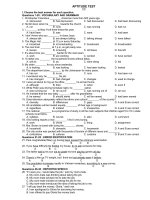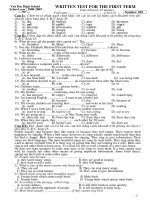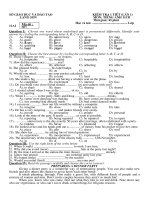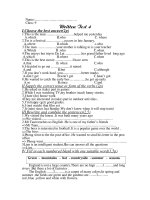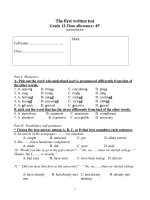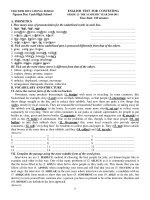Written practice for grade 12 keys
Bạn đang xem bản rút gọn của tài liệu. Xem và tải ngay bản đầy đủ của tài liệu tại đây (34.32 KB, 3 trang )
<span class='text_page_counter'>(1)</span><div class='page_container' data-page=1>
<b>Test 1- Grade 12</b>
<b>I/ Complete the sentences, using the present perfect, present perfect progressive, past perfect or past perfect </b>
<b>progressive</b>.
1. The children are at the park. They (play)...ball for the last two hours, but they don’t seem tired yet.
2. This was the fisrt time we (be)...to the castle, even though we (visit)...Edinburgh a few
times before.
3. He (break)...his finger and is in a lot of pain.
4. At last the bus came. I (wait)...for 20 minutes.
5. Good, the noise (stop)...I can start concentrating on my work again.
6. We were extremely tired at the end of the journey. We (travel)...for more than 24 hours.
7. Lisa is still writing letters. She (write)...letters all day.
8. My teacher was really annoyed with me. It was the third time I (arrive)...late for school that week.
9. I (swim)...and I feel exhausted.
10. I (lose)...my address book. Have you seen it ?
11. He (play)...football all afternoon and needs a shower!
12. When I last saw John, he (run)...and was out of breath.
13. We (own)...the car for 6 months before we discovered it was stolen.
14. I ( read)...this book on astrophysics for hours and i’m still only on page 6.
15. (not, like)...ice- cream since I ate too much and was sick.
II/ Use future form: <b>Will + infinitive, Will + be + Ving, Will + have done, will have been + Ving.</b>
1. Will you have lunch with me on 24th<sub> ? I’d love to, but I’m afraid I ( do)...my exam.</sub>
2. In a hunred years’ time people ( go)...to Mars for their holiday.
3. By the end of my university course I ( attend)...1,200 lectures.
4. Without more cheap housing, families ( leave) ...the village and find home in town.
5. Weather forecast says that the rain ( clear)...by the morning and tomorrow will be dry.
6. I suppose by now school ( close)...for Christmas and you ( enjoy)...a rest
7. In two years’ time Morneau (act)...for 50 years and show no sign of retiring from the theatre.
8. Don’t ring her up at 10 o’clock; She (put)...the children to bed. Ring later.
9. This time next Monday I ( sit)...in Paris cafe’ reading Le Figaro.
10. I’m confident that I ( finish)...the report before the end of the week.
11. This book on proust is really difficult. On Saturday I (read)...for a month , and I’m still only haft
way.
12. I (use)...my car until next week, so you can borrow it if you like.
13. I’m enjoying the course. I (learn)...a lot by the time I’ve completed it.
14. I’ve got an examination tomorow, so I can’t come out tonight. I (revise)...all evening.
15. I’m late with my project. I (not, finish)...it by the time we’ve supposed to hand it in.
<b>III/ Supply the correct verb forms</b>.
1. It’s raining right now. As soon as the rain ( stop)..., I’m going to walk down town.
2. On arrival at home I (find)...that she ( leave)...just a few minutes before.
3. He (light)...a cigarette and( walk)...to the door.
4. I’m sorry I couldn’t stop when I (see)...you the other day. ( ( catch)...a train, so I was in a hurry.
5. She ( sleep)...for 10 hours! You must wake her.
6. David ( repaire)...the TV set at the moment. He( work)...at it for one hour or so.
7. Just as I (leave)...home for school the telephone ( ring)...
8. For the last 6 months I (have)...a job as a hospital poster.
9. I suppose when I (come)...back in two years’ time, They (pull)...down all these old
buildings.
10. It’s an hour since he ( leave)...his office, so he must be home now.
11. At this time next week they ( sit)...in the train on their way to paris.
12. As soon as I ( reture)...to my desk, I (notice)... that my computer ( make)... a
funny noise.
13. Pedro ( change)...his major three times since his (start)...school.
14. I ( expect)...the mail an hour ago, but it not come yet.
15. While I (walk)...up to the mountain, I (get)...tired. But I (not, stop)...until
I ( reach)...the top.
<b>IV/ Complete each of these sentnces with an approciate preposition</b>
1. Do you believe...”contractural’ marriage ?
2. What fisrt attract you ...the study of Buddhism ?
3. In the psat parents usually decided ...the marriage of thei children.
4. A survey was made to determine the students’ attitudes...love and marrige.
5. We’re studying the body’s immune response...the virus.
6. He is more concerned...what peole think about him than anything else.
7. Few Asian students agreed ...the american students’ view that wives and husbands should share all their thoughts.
8. A happy marriage should be base ...love.
9. There differences and simmilarities...Vietnamese and American cultures.
10. Let’s confine our attention...the problem of illegal drugs.
<b>V/ Complete the second sentence so that it has a similar meaning to the first. ( Use the word(s) in the brackets</b>.
1. I’ve arrange to have next week off work. ( I’m)
...
2. This time tomorrow we’ll be in the air over the Atlantic ( flying)
...
3. We’ll get to the theater after the beginning of the play ( by the time)
...
4. Anderson is the winner of this year’s Grand Prix ! ( won)
...
5. During my dinner, the phone rang ( while)
</div>
<span class='text_page_counter'>(2)</span><div class='page_container' data-page=2>
...
7. Weeks passed as Karen lay in hospital. ( for)
...
8. Jack left the office before I arrived ther ( when0
...
9. There’s a party at Mary’s house next Sunday ( having)
...
10. The last time Nancy came here was in 1996. ( since)
<b>VI/ Fill in each gap with a word from the box.</b>
<b>Compulsory</b> <b>educational</b> <b>methodical</b> <b>academic</b> <b>curriculumn</b>
<b>Certificate</b> <b>tution</b> <b>categories</b> <b>examination</b> <b>secondary</b>
1. The college offers both...and professional qualifications.
2. They all have to stydy French because it’s on the ...
3. Primary education is ...for all children from 6 to 11 years old.
4. ...school is a school for young people between the ages of 11 and 16 or 18.
5. We found this TV program...It give people useful knowledge.
6. Computer viruses fall into three broad...
7. Jane is a ...girl. She always do things in a careful and logical way
8. ...increased by 5% at state universities this year.
9. Dspite his disability, he tried his best to get a Postgraduate...in education
10. GCSE is a British...taken by students in England and Wales and some other countries, usually around the
age of 16.
<b>VII/ Change these sentences into passive voice</b>
1. We know that the prime Minister has bought a holiday home.
...
2. The decision has deprived many people of the right to vote.
...
3. The farmer prevented walkers from crossing the field after he fenced it off.
...
4. They will announce the president’s arrival to the waiting journalists.
...
5. People are spending far more money on food now than they spent 10 years ago.
...
6. Nobody told me that they had discharged John from the hospital.
...
7. I want you to leave me alone.
...
8. I remember that my father took me to the town to see that film.
...
9. Someone told him he couldn’t take the examination.
...
10. He objects to people laughing at his mistakes
...
11. The host gave us a very warm welcome.
...
12. Has anyone ever taught you how to behave ?
...
13. Someone will tell her which bus to catch.
...
14. Thieves broke into the house.
...
15. Some adults say a lot of nonsense.
<b>Keys to test 1</b>
I/
1. have been playing 2. had been
3. has broken 4. had been waiting
5. has stopped
6. had been traveling 7. has been writing
8. had arrived
9. have been swimmimg
10. have lost
11. has been playing 12. had been running 13. had owned
14. have been reading/ have read
15. haven’t liked
II/
1. will be doing
2. will be going
3. will have attended
4. will leave
5. will have cleared
6. will have closed/will be enjoying
7. will have been acting/ will have acted
8. will be putting
9. will be sitting
10. will have finished
11. will have been reading
12. won’t be using
13. will have learned
14. will be revising
15. won’t have finished
III/
1. stops
2. found/ had left
3. lit/ walked
4. saw / was catching
5. has been sleeping
6. is repairing
7. had left/ rang
8. have had
9. come/ will have pulled
10. left
11. will be sitting
12. returned/ noticed/ was making
13. has changed/ started
14. expexted / hasn’t come 15. was walking/ got/ didn’t stop/ reached
IV/
1. in
2. to
3. on
4. towards
5. to
6. about/for
7. with 8. on
9. between
10. to
V/
1. I’m having/ I’m going to have next week off work
2. This time tomorrow we’ll be flying over the Atlantic.
3. By the time we get to the theater, the play will have begun
4. Anderson has won this year’s Grand Prix!
</div>
<span class='text_page_counter'>(3)</span><div class='page_container' data-page=3>
7. Karen lay in hospital for weeks.
8. When I arrived at the office, Jack had left.
9. Next Sunday Mary is having a party at her house.
10. Nancy hasn’r been here since 1996.
VI/
1. It is known that the Prime Minister has bought a holiday home./ The Prime Minister is known to
have bought a holiday home
2. Many people have been deprived of the right to vote.
3. Walkers were prevented from crossing the field after it was fenced off ( by the farmer)
4. The President’s arrival will be annuonced
5. Far more money is being spent on food now than was spent ten years ago.
6. I wasn’t told that John had been discharged from the hospital.
7. I want that I should be left alone/ You are wanted to leave me alone
8. I remember being taken to town to see that film
9. Someone told that the examination could not be taken
10. He objects that his mistakes should be laughed.
11. We were given a very warm welcome by the hosts/ a very warm welcome was given to us by the
hosts
12. Have you ever been taught how to behave ?
13. She will be told which bus to catch
</div>
<!--links-->
